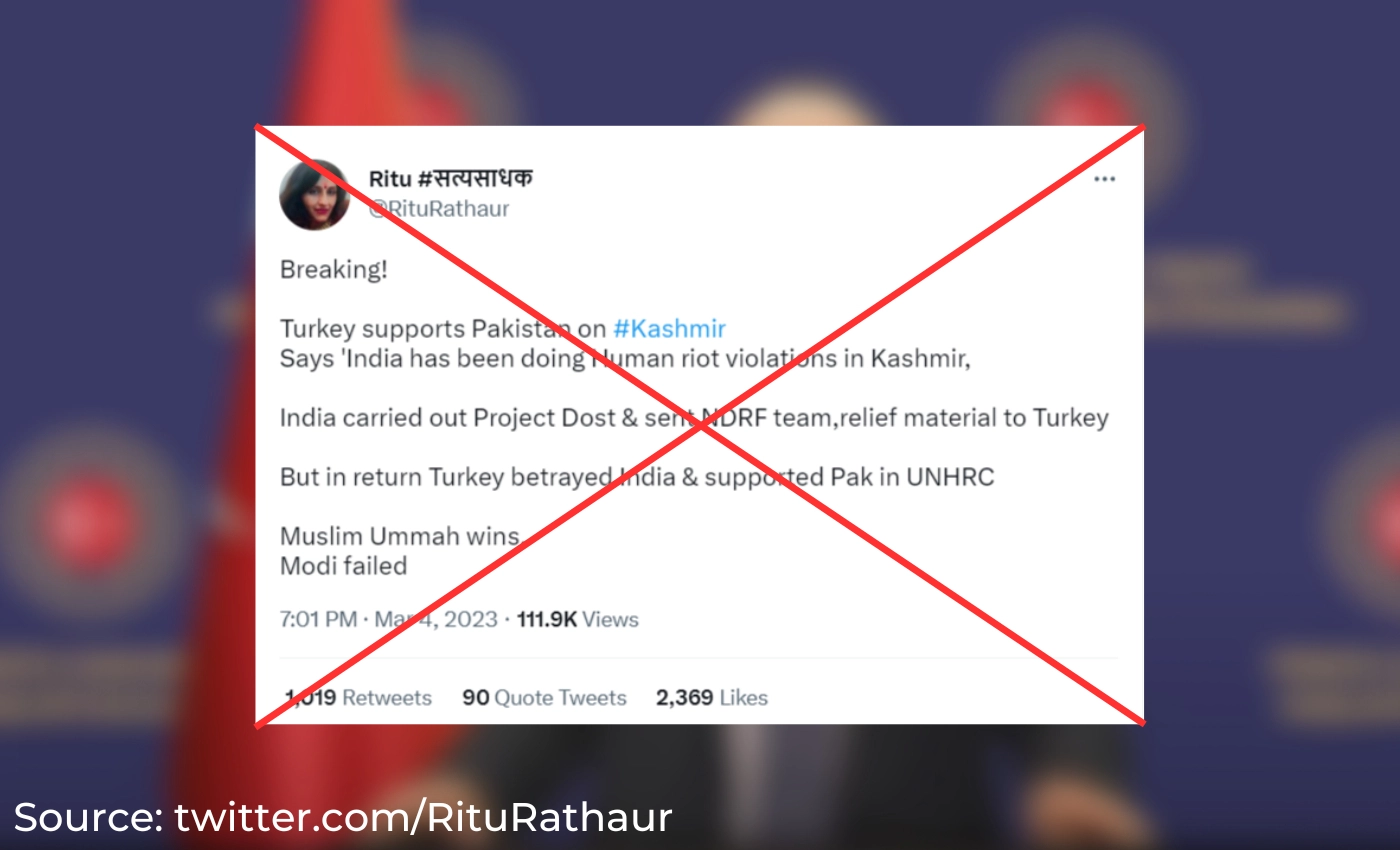By: Rahul Adhikari
March 13 2023
False: Turkey supported Pakistan at the UNHRC and said India is guilty of human rights violations in Kashmir.

The Verdict False
Turkey's comment on Kashmir in the UNHRC session in Geneva did not mention India and Pakistan.
Context
Following the earthquakes in Turkey and Syria, the Indian government launched "Operation Dost" to provide humanitarian aid to the affected countries. India sent search and rescue teams, as well as medicines, equipment, and relief materials to Turkey and Syria as they attempted to recover from the earthquakes and the multiple aftershocks.
On February 27, Turkey's Deputy Minister of Foreign Affairs Mehmet Kemal Bozay attended a session of the United Nations Human Rights Council (UNHRC) and spoke about Kashmir, among other global issues. Several users claimed that Turkey supported Pakistan at the UNHRC and said, "India has been doing Human riot violations in Kashmir." One such post, which has one lakh views on Twitter, said that Turkey had supported Pakistan over India. It also pointed out that India sent help to Turkey, but the nation had "betrayed India and supported Pak in UNHRC." The same claim was shared by other accounts as well, garnering huge engagement. Rashtriya Swayamsevak Sangh-published Hindi weekly magazine Panchjanya also made the same claim on their Twitter account in Hindi, garnering over 4.5k retweets and 17k likes.
In Fact
More than 100 heads of state attended the opening session of the UNHRC in Geneva on February 27, seeking to tackle worldwide human rights issues. Turkey was one of the countries that addressed the session. Reuters live-streamed the session on YouTube, showing that Turkey was given the floor at around 07:06 hours in the video.
Bozay opened his statement by mourning the deaths caused by the earthquake and thanked the international community for its support. Bozay further spoke about Turkey's position on human rights issues in Syria, Afghanistan, Palestine, Libya, Armenia, and China, among others. Bringing up the Kashmir issue, the Turkish representative said, "Turkey wishes a peaceful resolution of the situation in Jammu and Kashmir on the basis of U.N. security council resolutions."
The livestream shows that during his speech, Bozay did not support Pakistan on the Kashmir issue or say that India is guilty of human rights violations in Kashmir. The Turkish Deputy Minister of Foreign Affairs simply stated their position on human rights issues across several conflict-ridden areas of the world and made a passing reference to Kashmir. The U.N. also published a draft of the key speeches on February 27, which did not carry any mention of Turkey supporting Pakistan.
After Turkey's mention of Kashmir at the UNHRC, social media users slammed the country, causing "TurkeyNoDost" to trend on Twitter. Several Indian media organizations also published news videos using terms such as "backstab" and "betrayal" to describe Turkey's statement.
The statement from Turkey evoked a strong reaction from India, which has long maintained that matters related to the Union Territory of Jammu & Kashmir are its internal affairs and rejected third-party intervention on the issue. At the UNHRC session, India's representative responded to Turkey bringing up the Kashmir issue and advised that they "refrain from making unsolicited comments on our internal matters."
The Verdict
Bozay proposed a peaceful resolution of the situation in Jammu and Kashmir in the UNHRC Geneva session. While it is true that the minister mentioned Kashmir in his speech, he neither supported Pakistan nor slammed India for "human rights violations" in the valley. Therefore, we have marked this claim as false.


